
Storm in a Water Glass is a 1931 Austrian-German comedy film directed by Georg Jacoby and starring Hansi Niese, Renate Müller and Paul Otto. The film is based on the play of the same title by Bruno Frank, later adapted into the British film Storm in a Teacup. The film is known by the alternative title The Flower Woman of Lindenau. It is notable, in part, for the small role played by Hedy Lamarr in her second film. The film's art direction was by Hans Jacoby.

Target in the Clouds is a 1939 German drama film directed by Wolfgang Liebeneiner and starring Albert Matterstock, Leny Marenbach and Brigitte Horney. It was based on a novel by Hans Rabl. The film portrays the struggles of the fictional German aviation pioneer Walter von Suhr, an officer in the pre-First World War German army who saw the potential for military aircraft.
Liberated Hands or Freed Hands is a 1939 German drama film directed by Hans Schweikart and starring Brigitte Horney, Olga Chekhova and Ewald Balser. It was screened at the 8th Venice International Film Festival.

Rose-Girl Resli is a 1954 West German drama film directed by Harald Reinl and starring Christine Kaufmann, Josefin Kipper and Paul Klinger. The film made the child actress Kaufmann into a star. It was the debut film of the actress Karin Dor, who later married the director. It was shot at the Wiesbaden Studios in Hesse and on location in the vicinity. The film's sets were designed by the art director Heinrich Beisenherz.
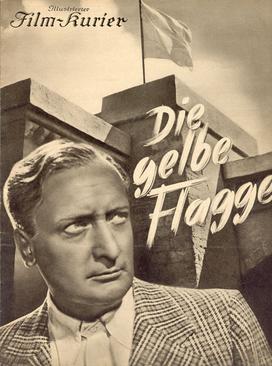
The Yellow Flag is a 1937 German drama film directed by Gerhard Lamprecht and starring Hans Albers, Olga Chekhova and Dorothea Wieck. It was shot at the Babelsberg Studios in Berlin. The film's sets were designed by the art director Ludwig Reiber. Location filming took place in Yugoslavia.
The Schimek Family is a 1926 German silent comedy film directed by Alfred Halm and Rudolf Dworsky and starring Livio Pavanelli, Olga Chekhova, and Lydia Potechina. It was shot at the EFA Studios in Berlin. The film's sets were designed by the art director Jacek Rotmil. It is based on the 1915 play of the same title by Gustaf Kadelburg, later adapted into a 1935 German film and a 1957 Austrian film.

The Divine Jetta is a 1937 German musical comedy film directed by Erich Waschneck and starring Grethe Weiser, Viktor de Kowa, and Marina von Ditmar.

Everything Will Be Better in the Morning is a 1948 German comedy film directed by Arthur Maria Rabenalt and starring Ellen Schwanneke, Jakob Tiedtke and Grethe Weiser.
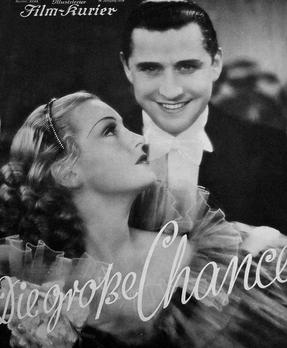
The Big Chance is a 1934 German musical comedy film directed by Victor Janson and starring Hansi Niese, Hans Söhnker and Jakob Tiedtke. It is part of the tradition of operetta films.

Artist Love is a 1935 German historical drama film directed by Fritz Wendhausen and starring Inge Schmidt, Wolfgang Liebeneiner and Olga Chekhova.

Grandstand for General Staff is a 1926 Austrian-German silent comedy film directed by Hans Otto and Erich Schönfelder and starring Alexander Roda Roda, Harry Liedtke and Olga Chekhova. It is based on a play of the same name.
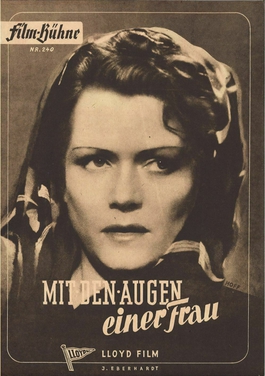
With the Eyes of a Woman is a 1942 German drama film directed by Karl Georg Külb and starring Ada Tschechowa, Olga Chekhova and Gustav Fröhlich.

Counterfeiters is a 1940 German crime film directed by Hermann Pfeiffer and starring Kirsten Heiberg, Rudolf Fernau and Karin Himboldt.

What Am I Without You is a 1934 German musical comedy film directed by Arthur Maria Rabenalt and starring Wolfgang Liebeneiner, Betty Bird, and Olga Chekhova.
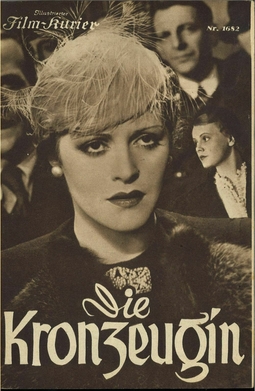
The Chief Witness is a 1937 German crime drama film directed by Georg Jacoby and starring Iván Petrovich, Sybille Schmitz and Sabine Peters. It was shot at the Babelsberg Studios in Berlin. The film's sets were designed by the art directors Otto Hunte and Willy Schiller. Location shooting took place in the Krkonose Mountains in Czechoslovakia and Zugspitze in Bavaria.
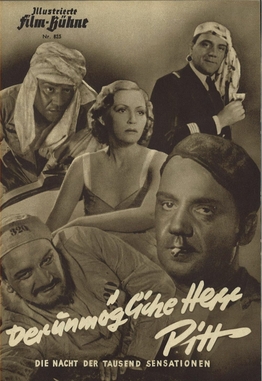
The Impossible Mister Pitt is a 1938 German adventure crime film directed by and starring Harry Piel. It also features Willi Schur, Leopold von Ledebur and Hilde Weissner. It was shot at the Babelsberg Studios in Berlin and on location off the coast of Split in Croatia. The film's sets were designed by the art directors Otto Erdmann and Hans Sohnle. It was based on the novel of the same title by Georg Mühlen-Schulte who also worked on the screenplay.

Police Report is a 1939 German crime thriller film directed by Rudolf van der Noss and starring Lola Müthel, Hans Zesch-Ballot and Erich Fiedler. It was shot at the Babelsberg Studios in Berlin. The film's sets were designed by the art directors Heinrich Beisenherz and Alfred Bütow. It was produced and distributed by Terra Film.

The Schimeck Family is a 1957 Austrian comedy film directed by Georg Jacoby and starring Theo Lingen, Fita Benkhoff and Helga Neuner. The film's sets were designed by the art director Leo Metzenbauer. It is loosely based on the play of the same title by Gustaf Kadelburg, which had previously been adapted into a 1935 German film The Schimeck Family.

Ways to a Good Marriage is a 1933 German drama film directed by Adolf Trotz and starring Olga Chekhova, Alfred Abel and Hilde Hildebrand. It was shot at the EFA Studios in Halensee in Berlin. The film's sets were designed by the art directors Heinz Fenchel and Botho Hoefer. The film was based on the ideas of the sexologist Theodore H. Van de Velde and was in the tradition of the enlightenment films of the Weimar Republic. Although his work had already been forbidden by the new Nazi regime, it was not formally banned until 1937 despite protests by Nazi students in Kiel who were successful in having the film pulled from cinemas there.

Between Two Hearts is a 1934 German drama film directed by Herbert Selpin and starring Harry Liedtke, Luise Ullrich and Olga Chekhova. It is based on the novel Ulla die Tochter by Werner Scheff. It was shot at the Marienfelde Studios of Terra Film in Berlin and on location in Bavaria. The film's sets were designed by the art director Robert A. Dietrich.


















